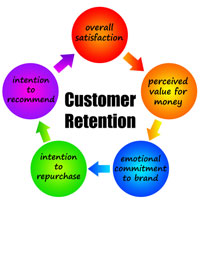

Welcome to VetNetwork’s
May 2011 Veterinary Marketing eNewsletter
Dear Clients and Friends,
It's finally Spring here in Dover, NH, and we are happy to see flowers and warm sunshine after a long winter. Your veterinary practice is sure to show signs of the Spring, too, with pet owners showing renewed interest in preventive care for their outdoor dogs and cats.
We are sending this veterinary marketing enewsletter to remind you that marketing your veterinary practice does not have a season: It must continue all year.
In this issue, we have veterinary marketing tips and strategies for getting new clients to your hospital door, pricing your services for profit, and making sure your veterinary website's personality isn't driving clients away.
We've also included practical information on technology, from surge protectors to veterinary hospital website hosting. This month, we are providing some legal information about your obligation to archive veterinary client emails, and our research may surprise you.
Thank you for subscribing to our veterinary marketing newsletter. We hope you enjoy this issue.
Happy Spring!
—Dr. Mark Feltz, DVM, and the Creative Team at VetNetwork
If you like our newsletter, please "LIKE" our page on Facebook...




Pricing Your Services for
Profit and Value
You can be at the top of your profession as a veterinarian, but still have a struggling practice if you don’t make business operations a top priority.
Studies show that far too few veterinarians understand that effective use of financial concepts are as critical to their success as providing quality care. And yet, the same studies reveal, those who do become experts in utilizing the powerful tools available to increase profitability enjoy superior success among their peers.
A 2011 report by Bayer Health Care’s Animal Health Division and the National Commission on Veterinary Economic Issues examines decreasing client visits and the resulting loss of revenue at veterinary hospitals nationwide.
The Bayer Veterinary Care Usage Study reveals that 62 percent of practices do not use financial concepts to manage their business and that the practices that do employ a range of financial concepts, such as pricing strategies, are two-thirds more profitable.
This demonstrates that what is true for all professionals is also true for veterinarians: There’s no such thing as a good business without a business plan including good financial concepts.
Pricing as a Priority
Researchers with The Bayer Veterinary Care Usage Study found that when compared to other professions such as CPAs, chiropractors, dentists, and physical therapists, veterinarians came in dead last in terms of profit margin at an average of 10.5 percent.
The study identifies six key factors limiting client visits, four of which can be impacted by veterinarians. Of the four, pricing stands out the most. In fact, clients said that the frequency and amount of price increases for animal care affected their spending decisions, and that veterinary costs usually were much higher than they expected.
FACT
|
In slang terms, clients described the experience of ‘sticker shock.’ By contrast, they said they would visit the veterinarian’s office more regularly, particularly for preventive care, if they were aware of ways to save money while retaining quality.
It stands to reason that increased visits translate into greater profit. So the question becomes: what can a veterinarian do to satisfy the client’s need for value, and in turn, get them to come in more?
Just like you, your clients have high expectations for flexibility and personalized services, especially when it comes to pricing and payment. They want options that meet their needs and make them feel valued. They also will respond favorably if they believe they are getting a better deal than what is offered at competing practices.
However, don’t confuse pricing strategies with undercutting or a competition for offering the lowest prices. Rather, you want clients to know that your practice’s cost and quality as a package make for a good value when it comes to money spent.
TIP: THE BASICS OF PRICING
|
Veterinary Pricing Strategies
Though some of the following pricing strategies are underutilized in the veterinary community, they are embraced and successful for nearly every other type of business.
Strategies to consider are:
- Payment Plans: Breaking overall cost into manageable payments makes clients feel empowered and better able to afford products and services. Meanwhile, you can charge a premium because clients see the broken down payments as more manageable and attractive than one larger payment that must be made at the time of service.
FACT: PAYMENT PLANS BUILD BUSINESS |
- Bundled Services and Volume Discounts: If you aren’t certain what bundled services are, think about your household utility bills. Companies like Comcast and Verizon are experts at enticing customers by offering discounted rates when you bundle together television, phone and high-speed Internet services. McDonalds does this, too, by making it cheaper to buy a burger, fries and soda together on the Value Menu than to purchase each individually. As a veterinarian, you have similar bundling opportunities. For instance, with a regular wellness exam you can offer reduced prices from a menu of complimentary and ancillary services.
- Using Pricing as a Marketing Tool: Prices communicate messages. Your local car wash offers a range of prices for a graduated tier of washes. The message is that the more you pay, the better your car will be cleaned and protected. As a veterinarian, when you know the price scale for services in your area, you can establish a reasonable price at the higher end of the range and send the subtle message of quality: You hit the intersection of quality and value. Drive home this message in your marketing and advertising.
- Charm Pricing: This refers to prices such as $4.99 for a fast-food meal, or $19.99 for a mouse for your new computer. That is, $19.99 is more attractive to consumers than $20.15. As a veterinarian, you may find that you increase client visits by offering a wellness exam and vaccinations at $149.99 rather than $151.67. You can also apply the principles of charm pricing to the pet care products you sell. Again, you want these prices to hit the intersection of quality and value.
Additional Ideas: Some other pricing strategies include targeted incentives for lapsed clients and during slow periods of the year; lowering exam fees for first-time clients; and asking for a premium at peak times of the day or week, and offering discounts for off-peak periods.
PRICE INCREASES HAPPEN Sometimes you have no choice: You have to raise your veterinary clinic or hospital prices. So what can you do to soften the blow to your valued clients?
|
Unfortunately, as overhead increases, you may have to raise prices periodically.
The strategies outlined above can help reduce the frequency of increases, as well as make them less noticeable. The bottom line is that when people think your service is worth it, they truly are willing to pay a little extra for your products and services. It’s your job to make them understand your value. And that’s just good business.

What's a Groupon?
If you guessed that it’s a large, elusive, sweet-tasting fish, you are way off. Groupon is a clever new concept in marketing promotions that is taking off in metropolitan areas. The idea is to offer a great deal on goods or services to a select audience, and when enough people agree to take advantage of it, the deal is activated. So, as the name implies, Groupon is a “group coupon.”
When your business partners with Groupon, you agree to offer a deep discount on a product or service for a short period of time, and Groupon posts this offer as an “e-coupon” on its popular website. Users who have signed up with Groupon for deals in your area will get an email inviting them to purchase the coupon. Your business gains a number of new customers, and Groupon keeps a percentage of the sales.
Groupon’s marketing model is valuable because it solves the problem of getting small, local businesses to advertise online. It’s also extremely lucrative. Over the past year, Groupon has grown from 200 employees to 6,500, from 3 million subscribers to 70 million, and has seen its potential price tag surge from $1.4 billion to more than $25 billion. In the fall of 2010, Google reportedly offered to buy Groupon for $6 billion, but the negotiations ended in December with no sale.
Can Groupon Work for Your Veterinary Practice?
Because Groupon is focused on a local community, a veterinary practice is well-suited to this kind of marketing. If your practice is located in one of the metropolitan areas where Groupon is active, it is a great way to gain new clients. Even if you are outside of the area, Groupon discounts may be picked up by your local patrons. For example, the Boston-based Groupon site has several offerings for businesses located in New Hampshire and Maine.
Groupon can work for any business, but designing the right offer is critical. If your practice wants to attract new clients, offering half off an initial wellness exam might seem like a good idea. If you decide to offer 500 of them, it may put financial stress on your business. To help you design your offer, consultants are available at GrouponWorks. They will make recommendations on the number and kind of Groupon vouchers to offer, based on their clients’ experiences.
Although your business does not pay Groupon for posting the coupon, Groupon makes money by keeping approximately half the money the client pays for the coupon. So, for example, a pet vaccination visit could be purchased online at a discount, and then Groupon and your practice would split the purchase price. The site offers a money-back guarantee in case you are not satisfied with your results.
Like any marketing or advertising tactic, offering a Groupon carries some financial risk, but has the potential to bring a whole new group of local clients to your hospital door.


Are You Breaking the Law
By Not Saving Client Emails?
It’s a litigious society in which we live and do business today. Practice owners know that there are risks of being sued for serious and sometimes frivolous reasons. If you’re in the midst of a lawsuit, this is not the time to start deleting emails. In fact, this may be a criminal offense. What are your legal obligations in regard to archiving emails to and from clients?
This question has to do with the Federal Rules of Civil Procedure (FRCP), which define best practices for large and small businesses that might be involved in civil lawsuits. In 2006, the FRCP was amended to include email and instant messages best practices. This change was necessary since 90% or more of business communication was being handled through electronic messaging methods.
Most organizations know that if a situation arises that may have the potential for litigation; they must preserve all possible evidence. This obligation is called “litigation hold.” If an employee deletes a relevant email and there is no central copy, the company could receive sanctions for destroying evidence. The courts have not been kind to businesses that could not retrieve information due to insufficient IT resources.

Have a Written Policy and Follow It
The best way to protect your veterinary practice is to have a written policy on archiving emails and to be sure each employee adheres to it. If you have a policy to save emails for 90 days, they are discoverable. That means that if your practice is involved in a lawsuit, the other party’s attorney has a right to see (to “discover”) those emails that are relevant to their claim. If your policy states that older emails will not be archived, you will not be penalized for deleting them after 90 days as a matter of course.
Some companies, such as financial companies involved in stock trades or pension plans, are required by the Securities and Exchange Commission to save emails for a predetermined number of years. That is not the case with a veterinary practice. Unless you are involved in a lawsuit, or have reasonable expectation that a suit is coming, you are in compliance with the FRCP as long as you are following your own published policy. Remember that emails are just as likely to support your side of the story as to assign blame to your practice.
You can usually tell if a lawsuit is on its way. If there is an incident resulting in injury, or an angry comment that has been made by a client (“I’ll see YOU in COURT!”), you must immediate institute a litigation hold. Your employees should know ahead of time exactly what that means, so be sure to add it to your policy.

Self-loving Websites
Don’t Attract Customers
There are people in the world who are so self-centered and self-absorbed that they can’t see past their own noses. They talk constantly about themselves and show no interest in others. If this person were your salesperson, you would be losing clients.
Websites have personalities, too. The way they are written and designed makes an impression on the visitor. Does your vet site show off a pleasant, friendly personality? Or is it a self-centered narcissist? If the content of your veterinary site goes on endlessly about your state of the art equipment, your technological superiority, your ability to perform cruciate ligament repair, you may have a narcissist.
Visitors to your veterinary hospital's website are looking for something, whether they want information, discounts, or to compare your practice with another. They want to know, “What’s in it for me?” Yes, clients want to bring their pets to a technologically-advanced animal hospital, but believe it or not, they are more concerned about the friendliness of the staff and the comfort of the waiting room. They want you to spend time explaining their pet’s health problems rather than talking about the high-tech instruments that led to your diagnosis.
Make Sure Your Veterinarian Website is Free of Ego

It’s as simple as this: Put your client and prospective client ahead of your practice. Before going live, have friends, relatives and clients read and comment about your vet website. Read your veterinary website yourself, as if you were a prospective client, and ask these questions:
- Does it portray your place of business as welcoming, comfortable, clean and friendly?
- Is it attractive to look at, with simple, uncluttered pages and easy navigation?
- Does it offer you a reason to act—to cut a coupon, pick up the phone, or visit a Facebook page?
- Does the content answer your clients’ most important questions?
- Does the website support its claims with testimonials or links to local reviews?
If you are concerned that you have a narcissist, it’s time to get new content. Hire a good veterinary website design company that specializes in veterinary websites, and have it redesigned around the needs of your clients and prospects. Content that only strokes your practice’s ego is just propaganda, and will drive people away. An attractive, customer-focused website that answers visitors’ concerns will attract clients and increase profits.



Is a Surge Protector Enough
to
Protect Your Computer?
Viruses and other forms of malware are not the only threats to your computer and the data stored on it. Power surges, even small ones can wreak havoc on computer components and data.
Most computer owners know that plugging their computer into a surge protector is a good idea, but there really is more that you need to know in order to keep your computer safe. The following should help you understand how to prevent damage to your computer and lost data.
Primary Dangers
Computers need a steady supply of 120 volt AC current in order to run properly. Even a relatively small disturbance can harm a computer and fluctuating voltage and current over time can damage a computer.
The three primary causes of power surges are:
- Lightning – Strikes to electric and phone lines and equipment—even when it is miles away—can send a devastating surge of electricity into your business and its computers causing a total loss of hardware and data. It is important to note that cable and DSL lines are as vulnerable as an electric line.
- Blackout and Brownout – A total (blackout) or partial (brownout) loss of power to the home or business can affect the performance of your computer and cause a damaging surge when full power is restored.
- Internal Causes – When devices in the home or business with electric motors, such as HVAC equipment, refrigerators, dryers, washers, etc., turn on and off they can cause the power supply to your computer to dip and surge.
You should also know that external components such as printers, scanners, faxes, and monitors can be affected by power surges and can pass a power surge into your computer.
Protecting Your Computer
First, never plug a computer or any external components directly into the wall. This makes them susceptible to all forms of power surges and doesn’t offer any protection at all.
Also, in the event of a lightning storm the safest precaution you can take is to unplug your computers and any components attached to the computer. This should include coaxial cables and DSL lines, anything that connects to lines outside of the building. Generally speaking, though, your computer should be plugged into one of the following pieces of equipment:
Surge Protector – This is the most commonly used means to protect a computer from power surges. A surge protector is a power strip that is able to absorb an electrical surge before it gets to your computer. It is important to note that not all power strips are surge protectors. Also, a good surge protector will have plugs for DSL and cable lines as well.
You should also be sure to read the surge protector’s specifications to be sure it is rated to handle large power surges, such as from a nearby lightning strike. Unfortunately, if your home or business is hit directly by lightning there is little a surge protector can do. This is why unplugging everything as a storm passes overhead is the best thing to do.
Uninterrupted Power Supplies (UPS) – These provide surge protection, but go one step further by also working to stabilize, filter, enhance or modify power throughout the day and during blackouts and brownouts. Many UPS will also come with software and a USB port connection to save and close open files and power down (logoff) the computer during a blackout or brownout.
However, UPS are a bit more expensive than surge protectors—they can range from around $100 to $1,000—but on balance they offer quite a bit more protection than just a surge protector.
The bottom line is that power surges are a continuous threat to your computer and its data. A surge protector or UPS with some prudent steps can go a long way to making sure your hardware and data are safe.


Why Veterinary Webhosting Matters to
Your Practice
With nearly 200 million websites in existence, it is vitally important that anyone who wants their website to carry as much marketing weight as possible optimize their chances for success. This means paying strict attention to veterinary website design and veterinary Search Engine Optimization, but also requires a deeper understanding of the importance of webhosting.
What is a Webhost?
Much as it sounds, a webhost is a company that provides space on a webserver for the files and databases that comprise a websites. For most, they provide the basic background services that enable a website to be found on the Internet and assure that it is available with as few interruptions as possible. Webhosts also provide services to ensure the security of the website’s data and files.
For some, though, they go well beyond merely providing a secure home for websites to include a number of value-enhancing services. This is where your choice of a webhost matters.
Not All Webhosts Are Equal
Basic webhosting services are fine for most people. They merely are seeking an inexpensive and secure host for their website. However, for businesses, especially those within specific professions-such as the veterinary field, choosing a veterinary webhost is a strategic decision.
This fact is even more obvious for veterinary hospitals because unlike other professions you are uniquely on your own in terms of marketing and building your veterinarian practice. Therefore, selecting a webhost for your hospital is the equivalent of establishing a strategic partnership capable of helping you market and grow the value of your practice. You want a partner that understands the unique challenges and idiosyncrasies of being a veterinarian.
VetNetwork is the only veterinary website design and webhosting company owned and managed by a veterinarian that is dedicated to creating and administering websites for veterinary hospitals and the veterinary profession. As something of a one-stop-shop for veterinary websites and online vet marketing services, we are uniquely able to design, host and maintain your veterinary hospital's website.
VetNetwork’s advantages include:
A Single Chef Rather than Many Cooks – Not only can we create a beautiful and effective website for veterinary hospitals, but our hosting service creates a closed loop. The same set of veterinary marketing professionals that built and designed your website is in charge of maintaining and updating your vet website, as well as email support and minimizing website downtime
Domain Name Management – Whether you have one or multiple veterinary domain names guiding pet owners to your website, it is important to have a professional managing these names for you. Simply stated, for a variety of reasons it is possible to lose your domain name. When this happens (and it happens all the time), your veterinary website goes dark. VetNetwork offers veterinary domain name protection and renewal, and you maintain ownership. We also can help improve your domain’s Google ranking, which means pet owners will find you first.
Email Account Management – Your email is setup to incorporate your domain name (person@yourdomainname.com), which adds to your branding efforts. Our IT specialists maintain and manage your account so you never have to worry about email problems.
Responsive Partner – When you call or email VetNetwork, you receive customer support from staff that specializes in veterinary websites, marketing and IT services. When you call our office, Roxanne, our customer service specialist, answers the phone, not a machine with a recorded message. We also guarantee updates to your veterinarian website—new staff bios, additional services, edits to text, new photos, video, and more—within two days.
Value-Added Services – We also offer a number of value-added services designed to meet the marketing needs of a busy veterinary practice. These include:
- Newsletters updated each month
- Library of pet medical articles and videos
- Web-based email so you can check it anywhere, anytime, from any computer or device
- Website statistics tracking
- Search Engine Optimization


VetNetwork Veterinary Marketing Services
VetNetwork is a veterinary marketing and design company exclusively for the veterinary industry. Our services and products are guaranteed to increase your profits and attract new clients.
Read More...
Sincerely yours,
Mark Feltz, DVM and the Staff at VetNetwork
800–564–4215
vetnetwork.com/
Copyright © VetNetwork, LLC
